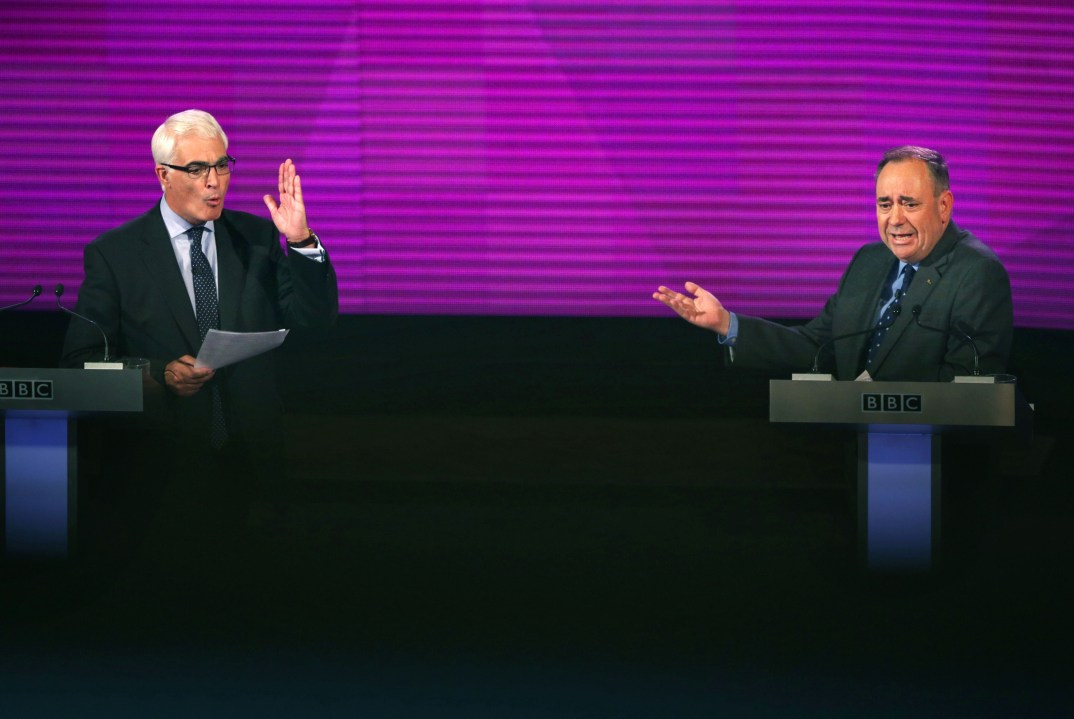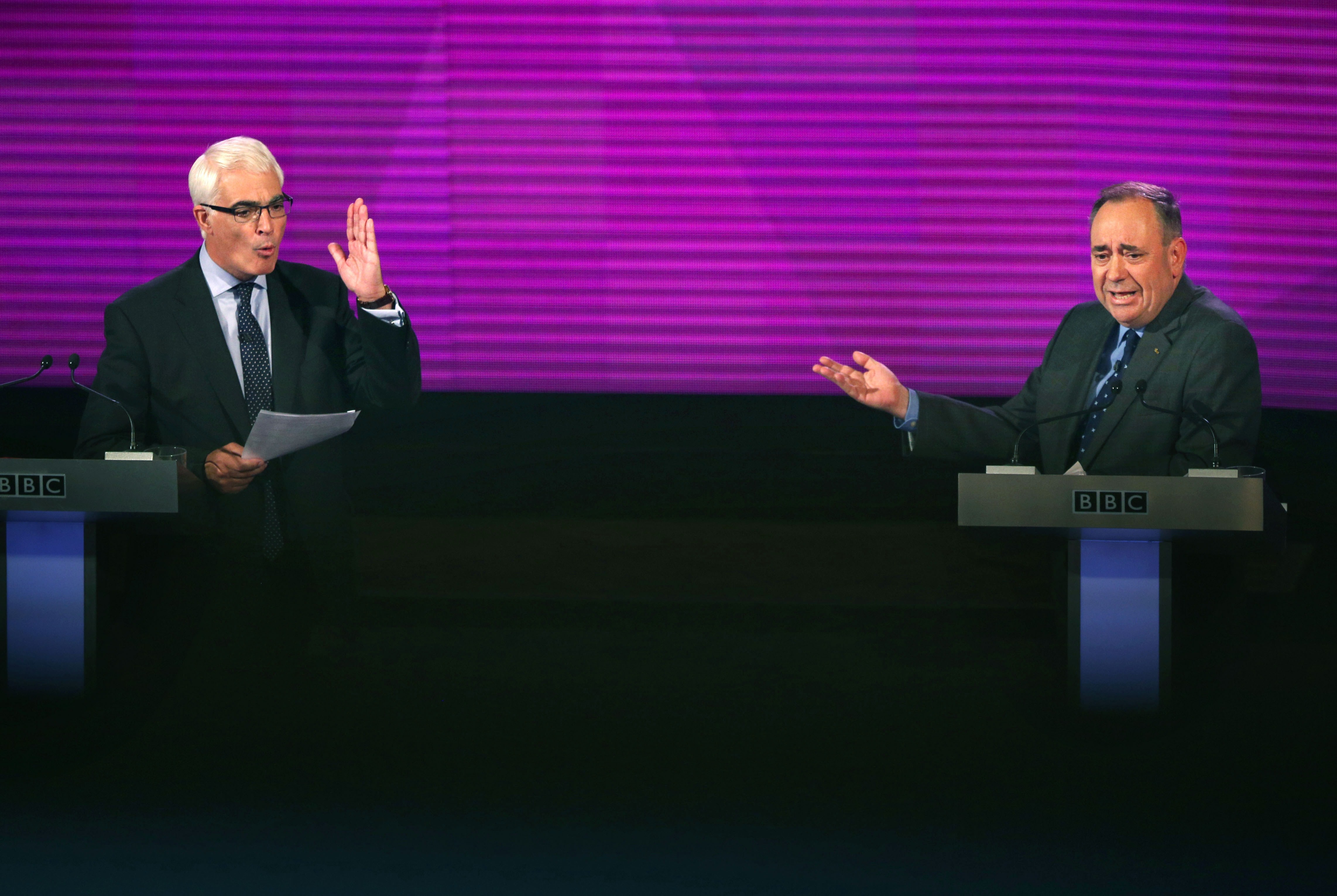Well that was a gubbing. No doubt about it. Alex Salmond won last night’s debate against Alistair Darling just as thoroughly as he’d lost their first encounter. Sure, some Unionists tried to put a cheerful spin on it – “We’ll take that” one senior Labour figure told me – but don’t you believe any of it.
Salmond, as predicted, was much better than he had been in the first debate. Darling, as predicted, was much worse. File this encounter in the drawer marked reversion to the mean.
Darling had many problems last night but among the greatest was the fact he’s not a Tory. Time and time again Salmond stuck him with the “in bed with the Tories” jibe and took great pleasure in seeing Darling squeal and wriggle. It’s not fair! Well, tough.
Salmond, like the Yes campaign in general, has largely given up talking to the wealthiest 40% of Scots and his tactics in this debate were pitched at lower-middle and working classes. Which is, of course, perfectly reasonable.
But Darling’s non-Toryism meant he had few answers and, worse, few defences. He was forced – by his leftism and by the conventions of Scottish orthodoxy – to play along with the notion that governments can create proper jobs and so he looked a fool when he couldn’t name any so-called “job-creating powers” that would be devolved to Holyrood after a No vote.
Nor could he make a case for welfare reform as a route back to work – and dignity – and he couldn’t make the argument that however uncomfortable life might be for the poorest sections of society it might be even less comfortable after independence. Ireland, which has a higher per capita GDP (the SNP’s favourite junk statistical measurement) than Germany is no better a place in which to be poor than Scotland now. It might even be worse.
But Darling was skewered by a question from the audience asking how, if we’re really better together so many of us don’t feel better right now. Darling blinked and never really recovered. His case for the Union last night was desperately feeble, even, at times, craven. He came across as a timid man leading a timid cause.
Both men made concessions that will cheer their opponents. Salmond conceded that the Scottish NHS is not going to be privatised (alas!) unless a Scottish government wants to privatise it. Darling accepted the obvious: of course Scotland can continue to use the pound after independence.
There is every difference, however, between doing so as part of a formal currency union and using the pound in a sterlingisation process. Salmond knows this, of course, and it is deeply disingenuous of him to try to muddy the waters and blur the distinction between these two very different policies. Darling, however, could have done more to point this out.
But that would have meant spending more time talking about the bloody currency and no-one could sensibly want that. Indeed, Darling spent far too much time banging on about the pound. Yes, it is an important issue. No, it is not the only important issue. And anyway we’ve heard enough about it already. Point taken. Shut up.
But back he went to the currency time and time and time again. So much so, in fact, that I began to think that, gosh, if Salmond could solve his currency dilemma (he can’t) this independence thing might be a skoosh. That’s the problem with being a one-trick pony: people get tired of your trick pretty quickly.
Just as Darling won the first debate because the important exchanges were on his favoured subjects so Salmond won last night’s encounter in part because he dominated the parts of the debate that really mattered. He likes talking about the NHS, about welfare, about Trident and about oil.
Sure, there might be less oil than Scottish government estimates suggest (it would certainly be prudent to work on that assumption) and, sure, there’s certainly no money for an oil fund but, look, this is not a debate that Darling was ever going to win. Salmond’s fundamental point – Oh, heavens, how will we cope with this awful burden of oil? – hits home and rings true. No oil, of course, no nationalist movement worth the name but that’s a different matter.
Darling, however, seemed flustered and discombobulated. Perhaps this is the problem with playing not to lose: you can forget how to win.
There are plenty of holes in the SNP’s case but Darling seemed unable – most of the time – last night to point them out. So Salmond won, not just by default but because he made the more persuasive case.
And, of course, he rediscovered the importance of lyricism: “This is our time. It’s our moment. Let us do it now.” A simple but powerful message that asks Scots only to believe in themselves. Since people like the idea of believing in themselves it’s neither a daft nor a fruitless appeal. Hope still matters.
Will it be enough? Well, I would expect the Yes side to enjoy a small bounce in the polls later this week. Perhaps a couple of points improvement. Whether that lasts as long as polling day, however, is a different matter.
Salmond won this debate and won it convincingly but the instant ICM poll should be treated with some care. It was, by definition, only a poll of the minority of voters who watched the debate and it was also a Yes-friendly sample. Before the debate 44% said they would vote Yes and 46% indicated they intend to vote No. By the end of the evening those figures had crept up to 45% Yes and 47% No.
Winning, in other words, is not necessarily the same thing as changing minds. Still, only a daftly optimistic Unionist could deny the fact that this was an important evening for the nationalists. Another defeat would not have decided the outcome but it would have stripped away reasons to believe in a Yes vote. As it is, Yessers are in buoyant mood and can approach the final three weeks of campaigning in fine fettle. That counts for something even if we do not know how much it counts for.
They haven’t gone away, you know.
Finally, I suppose some people will have been appalled by the tone and temper of the debate, especially the middle section in which the two men talked, nay shouted, over one another for nearly 20 minutes. I rather liked it. This is a big argument about a big issue and tempers should fray from time to time as the protagonists get stuck into each other. Proper politics for once, you know? So I reckoned that Glenn Campbell, the evening’s moderator, did a good job too. If voters can’t handle that sort of thing then tough.








Comments